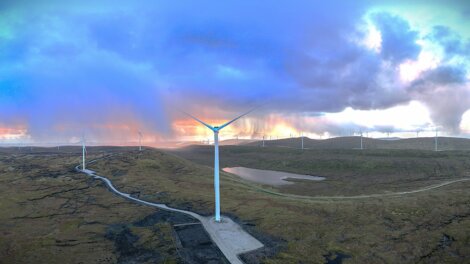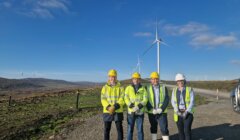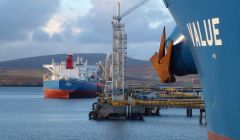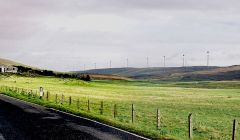Energy / Prime minister says constraint payments is a ‘problem we’re determined to fix’
PRIME minister Sir Keir Starmer says the issue of wind farm operators receiving constraint payments to stop turbines producing electricity is “not good enough”.
It comes after Northern Isles MP Alistair Carmichael raised the matter of Viking Energy wind farm operator SSE receiving more than £2 million in August in constraint payments.
The Liberal Democrat has called on the prime minister to “look seriously” at the need for an “islands tariff” to ensure proper benefit to communities with high fuel poverty hosting renewable energy developments.
This is something that Shetland Islands Council has been pushing with the government in recent years.
Constraint payments by the National Grid are made when the energy being produced in one part of the country cannot get to another because there is not the capacity to carry it.
The National Grid said it is “like paying road users to temporarily stay put, instead of building more motorways which will rarely be used”.
Speaking during prime minister’s questions, Carmichael cited frustrations in the community around the Viking Energy wind farm and its constraint payments.
He said: “Last month, SSE, the operators of the new Viking Energy wind farm in Shetland, were paid £2m in order not to generate any electricity from it.
“Is there not something badly wrong with an energy market that pays big corporates not to produce electricity, while the people living amongst the turbines endure some of the highest levels of fuel poverty in the country?
“So will the Prime Minister and the government now look seriously at the idea of an ‘islands tariff’, so that island communities such as those represented by me and his honourable friend the Member from Na h-Eileanan an Iar may see some genuine benefit for their community from hosting renewable energy developments such as this?”
Become a member of Shetland News
Responding, the prime minister said: “I thank him for raising this issue which is obviously a considerable concern for him and his constituents.
“The National Grid as he knows does balance the grid by occasionally requesting some generators to stop when there is not enough capacity on the network. That’s not good enough, that’s not acceptable for the reasons set out in his question. It’s a problem that wasn’t fixed over the last 14 years, but a problem that we are determined to fix as we go forward.
“I will make sure that the relevant minister speaks to him about the particular issue in his constituency.”
Reacting after the exchange, Mr Carmichael said “we need to see proper mechanisms to reward communities which are supporting the push to Net Zero and to end the disproportionate nature of fuel poverty in our islands – that is a point I shall be raising with ministers again in the coming weeks”.
Labour previously said constraint payments are “now costing the UK up to £62 million a day and goes straight on to consumer bills”.
Speaking prior to this year’s election, the party had said: “A Labour Government will remove the barriers to facilitate the largest upgrade to our national transmission infrastructure in a generation, bringing cheaper, cleaner power, energy security, and jobs to every corner of the country.
“We are confident the transmission operators can do it, because we did it before: between 1950 and 1975, UK electricity generation and associated grid capacity increased by almost five times.”
An SSE spokesperson said this week that the constraint of any energy asset is a decision for the national grid and not an individual company.
“The clear solution to improving capacity on the grid is to speed up investment in electricity networks so the UK can get the most out of its enviable renewable energy resources,” they said.
“A range of grid upgrade projects are already in development which will help alleviate the issue by increasing available grid capacity, and so will get more homegrown energy to where it’s needed.
“SSE is investing billions of pounds every year, much more than it makes in profits, in building the electricity infrastructure that will allow the UK, including Shetland, to fully benefit from its vast resources of clean, homegrown energy.”
Become a member of Shetland News
Shetland News is asking its many readers to consider paying for membership to get additional features and services: -
- Remove non-local ads;
- Bookmark posts to read later;
- Exclusive curated weekly newsletter;
- Hide membership messages;
- Comments open for discussion.
If you appreciate what we do and feel strongly about impartial local journalism, then please become a member of Shetland News by either making a single payment, or setting up a monthly, quarterly or yearly subscription.

















































































